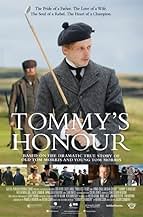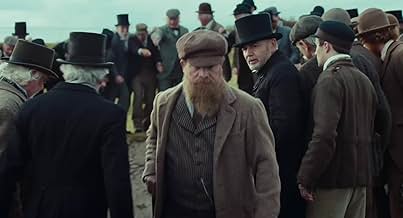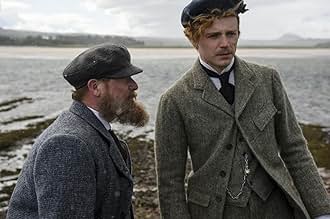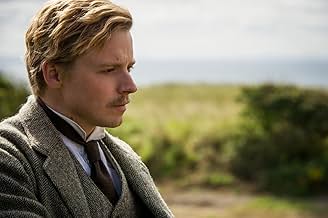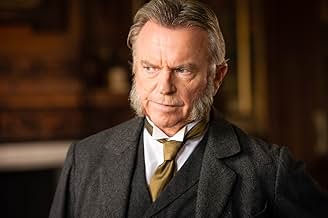ÉVALUATION IMDb
6,4/10
1,4 k
MA NOTE
Ajouter une intrigue dans votre langueIn every generation, a torch passes from father to son. And that timeless dynamic is the beating heart of Tommy's Honour - an intimate, powerfully moving tale of the real-life founders of th... Tout lireIn every generation, a torch passes from father to son. And that timeless dynamic is the beating heart of Tommy's Honour - an intimate, powerfully moving tale of the real-life founders of the modern game of golf.In every generation, a torch passes from father to son. And that timeless dynamic is the beating heart of Tommy's Honour - an intimate, powerfully moving tale of the real-life founders of the modern game of golf.
- Prix
- 1 victoire et 3 nominations
Dylan Murphy Neilson
- Young Jamie Morris
- (as Dylan Neilson)
Kimberly Sinclair
- Sally MacKenzie
- (as Kimberley Sinclair)
Histoire
Le saviez-vous
- GaffesIn 1870, the boys walk past a railway wagon with "LMS" painted on it. The London, Midland and Scottish Railway Company (LMS) did not come into existence until 1st January, 1923.
- Bandes originalesString Quartet KV 465 (nr 10) Dissonances: Allegro
Composed by Wolfgang Amadeus Mozart
Commentaire en vedette
With sixty million golfers on the planet, you would expect a movie about the early history of golf to delight audiences all over the world. The game is rich in tradition and a spectacle for big-money professional sport. The historical drama Tommy's Honour (2016) has much to offer for die-hard lovers of the sport, but most other audiences may find it rather dull.
The twin narrative inter-weaves the story of golf with the legend of the 'Two Tommies', the father and son team credited with launching the modern version of the sport. Set in 1860s Scotland, gruff Old Tom Morris (Peter Mullan) is groundsman for the famous St. Andrews Golf Club and he pioneered the early rules of the game including the 18-hole course standard. His 15-year old son Young Tommy (Jack Lowden) has grown up with game and becomes a better golfer than his record-holding father. When he beats his father's record, tensions boil over and Tommy wants to go his own way while Tom clings to past ways. The young champion tours the country winning match after match, and collecting more prizemoney and social respectability than his father ever dreamed of. When Tommy falls for Meg (Ophelia Lovibond), an 'older woman with a past', the family is torn apart.
The story reveals several fascinating things about golf, including how the once-exclusive Gentleman's Club sport became opened to universal participation and how big-money gambling was integral to the game. The primitive early equipment, the feather-stuffed hand-stitched leather balls, and the cow-paddock roughness of the course are interesting insights into the origins of modern golf. While the period sets, costumes and historical depictions have high production value, the characterisations and melodramatic performances leave the story muddled, tedious and repetitious. Old Tom is portrayed as a cantankerous domineering father who is difficult to like, especially for his regular rants against Tommy's behaviour. His Scottish accent is so strong that many people will miss much of what he says. Young Tommy is the likable one, although his attitudes to parental and aristocratic authority are far too modern for a working-class boy of 19th century Scotland. The dynamic between them is unremarkable and predictable, and the romance is subdued and uninspiring even though Meg provides the film's aesthetic high point. The backbone of the story comprises the various games that Tommy inevitably wins, the monotony of which can quickly wilt the patience of both golfers and non-golfer audiences.
The decision to spend so much of the film watching the primitive golf games of yesteryear has robbed the story of any narrative tension. As an historical drama, it shows how sport has potential to break down class barriers although today's private clubs would not agree. Anyone who loves and plays the game will wince at the sight of the early conditions under which it was played, but viewers unconnected with golf may struggle to stay awake with this one.
The twin narrative inter-weaves the story of golf with the legend of the 'Two Tommies', the father and son team credited with launching the modern version of the sport. Set in 1860s Scotland, gruff Old Tom Morris (Peter Mullan) is groundsman for the famous St. Andrews Golf Club and he pioneered the early rules of the game including the 18-hole course standard. His 15-year old son Young Tommy (Jack Lowden) has grown up with game and becomes a better golfer than his record-holding father. When he beats his father's record, tensions boil over and Tommy wants to go his own way while Tom clings to past ways. The young champion tours the country winning match after match, and collecting more prizemoney and social respectability than his father ever dreamed of. When Tommy falls for Meg (Ophelia Lovibond), an 'older woman with a past', the family is torn apart.
The story reveals several fascinating things about golf, including how the once-exclusive Gentleman's Club sport became opened to universal participation and how big-money gambling was integral to the game. The primitive early equipment, the feather-stuffed hand-stitched leather balls, and the cow-paddock roughness of the course are interesting insights into the origins of modern golf. While the period sets, costumes and historical depictions have high production value, the characterisations and melodramatic performances leave the story muddled, tedious and repetitious. Old Tom is portrayed as a cantankerous domineering father who is difficult to like, especially for his regular rants against Tommy's behaviour. His Scottish accent is so strong that many people will miss much of what he says. Young Tommy is the likable one, although his attitudes to parental and aristocratic authority are far too modern for a working-class boy of 19th century Scotland. The dynamic between them is unremarkable and predictable, and the romance is subdued and uninspiring even though Meg provides the film's aesthetic high point. The backbone of the story comprises the various games that Tommy inevitably wins, the monotony of which can quickly wilt the patience of both golfers and non-golfer audiences.
The decision to spend so much of the film watching the primitive golf games of yesteryear has robbed the story of any narrative tension. As an historical drama, it shows how sport has potential to break down class barriers although today's private clubs would not agree. Anyone who loves and plays the game will wince at the sight of the early conditions under which it was played, but viewers unconnected with golf may struggle to stay awake with this one.
- CineMuseFilms
- 1 oct. 2017
- Lien permanent
Meilleurs choix
Connectez-vous pour évaluer et surveiller les recommandations personnalisées
- How long is Tommy's Honour?Propulsé par Alexa
Détails
- Date de sortie
- Pays d’origine
- Site officiel
- Langue
- Aussi connu sous le nom de
- Честь Тома
- Lieux de tournage
- Écosse, Royaume-Uni(St Andrews)
- sociétés de production
- Consultez plus de crédits d'entreprise sur IMDbPro
Box-office
- Brut – États-Unis et Canada
- 569 306 $ US
- Fin de semaine d'ouverture – États-Unis et Canada
- 209 190 $ US
- 16 avr. 2017
- Brut – à l'échelle mondiale
- 751 345 $ US
- Durée1 heure 52 minutes
- Couleur
- Rapport de forme
- 2.35 : 1
Contribuer à cette page
Suggérer une modification ou ajouter du contenu manquant

Lacune principale
By what name was Tommy's Honour (2016) officially released in India in English?
Répondre







